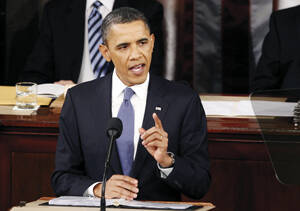The Republican-led House of Representatives voted 245 to 189 on Jan. 19 to repeal the Patient Protection and Affordable Care Act, commonly referred to as the health care reform law, a repeal unlikely to be considered by the Democratic-run Senate and which would undoubtedly be vetoed by President Barack Obama if it were to reach his desk. What are the next steps for those who would like to see changes or improvements in that law?
While declining to join efforts to repeal the reform, U.S. bishops are offering strong support to the “No Taxpayer Funding for Abortion Act,” introduced on Jan. 20. “The health care law made it clear that the current way we prevent taxpayer funding of abortion through annual riders is dangerously fragile,” said Rep. Dan Lipinski, Democrat of Illinois, co-chair of the Congressional Pro-Life Caucus. “We must take action to prevent federal funding for abortion under the health care law and throughout the government, without exception.” The House leadership also is taking another approach to improving—or replacing—the health reform law. A resolution approved on Jan. 20 by a 253-to-175 vote, including 14 Democrats, directed four House committees to come up with legislation that would preserve some aspects of the law.
Among other things, the resolution said, the proposed legislation should “lower health care premiums through increased competition and choice,” allow patients to keep their current doctors, give people with pre-existing conditions access to affordable health coverage, increase the number of insured Americans and “prohibit taxpayer funding of abortions and provide conscience protections for health care providers.”
Others who want changes in the health care reform law have taken a different tack. At least two dozen lawsuits have been filed in federal court against various aspects of the law. On Jan. 18 six more states joined in a Florida-led effort to overturn the requirement that each American carry health insurance by 2014 or pay a penalty to the government. More than half the states are now involved. In December, U.S. District Judge Henry E. Hudson declared the mandate unconstitutional in a separate lawsuit brought by the Commonwealth of Virginia. The Obama administration is appealing the ruling, and the issue is expected to reach the U.S. Supreme Court eventually.
Other legal challenges—brought by individuals, political or civic associations, small-business owners and groups of physicians or patients—find fault with the law’s effects on Medicare or Medicaid coverage, are concerned about the possibility that it will cause an increase in taxes or have objections regarding medical privacy or other provisions.








